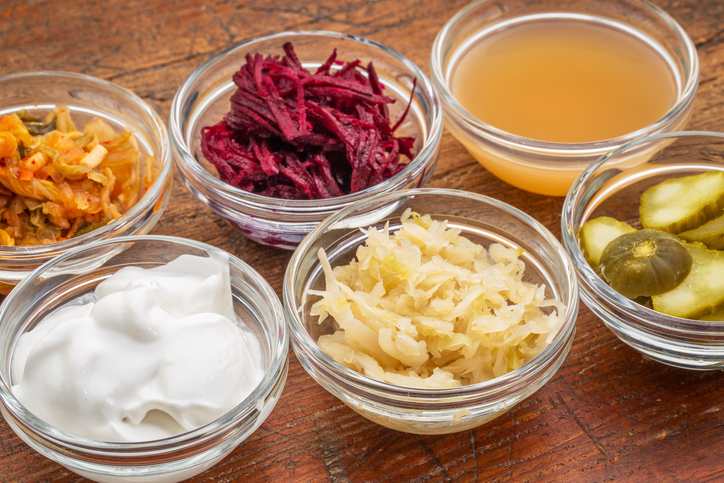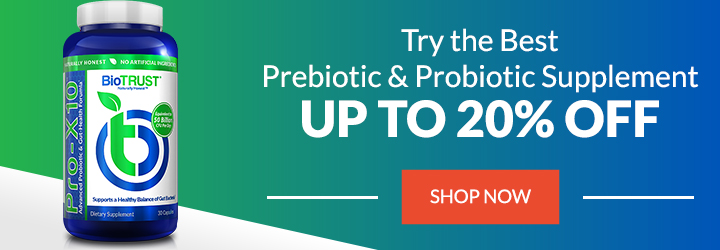Probiotics 101: What are Probiotics and Why You NEED Them?

There’s no question that probiotics are the talk of the town. According to a recent survey by the Council for Responsible Nutrition, besides vitamins and minerals, probiotics are the 4th most popular dietary supplement. They rank right up there with high-quality protein and omega-3 supplements. Yet, even though the term “probiotics” is part of our everyday vocabulary and many of us use them daily (or we should), you (like SO many people) may be wondering what are probiotics…how do they work…what are they good for…
These are really good, important questions. And there’s no shame in asking them. Heck, I still hear from people who are adamant about being gluten-free, yet they don’t actually know what gluten is or why they’re avoiding it. So, let’s take a step back and take a little lesson in Probiology 101.
What are Probiotics
Believe it or not, the precise definition is the subject of ongoing discussions. The current go-to definition comes from an expert panel of scientists working on behalf of the Food and Agriculture Organization of the United Nations (FAO) and the World Health Organization (WHO). As recently as 2014, an expert panel convened by the International Scientific Association for Probiotics and Prebiotics (ISAPP) confirmed the FAO/WHO definition of probiotics as: “Live microorganisms that, when administered in adequate amounts, confer a health benefit on the host.”1
It’s great that the scientific community has agreed on this definition, which is important for scientists, regulators, and the food and supplement industry. But it’s not all that helpful for people like you and me. Instead, we can think of probiotics as friendly, living microbes that help us stay healthy.
Often, you’ll hear people talk about probiotics being “good bacteria.” But the terms microbes and microorganisms are more accurate. Because while most probiotics are bacteria (namely lactic acid bacteria and bifidobacteria), certain yeasts (from the Saccharomyces family) also fall under the probiotic umbrella.2
Speaking of microbes, did you know you carry about 4 pounds of microorganisms (bacteria, yeasts, fungi, etc.) in your gut? It’s true. Your digestive tract houses roughly 100 trillion microbes. Considering there are over 30 trillion cells in the human body, that means you are over 3 times more microbes than you are cells. From a DNA perspective, the genes of these microbes exceed our human DNA by a factor of 100!
You may have heard people mention the terms microbiome, microbiota, and/or microflora, which are often used to describe the community microbes that live in the digestive tract. Yet, there are other microbial communities that inhabit the mouth, skin, and reproductive organs.
How Do Probiotics Work?
Now that we have answered “what are probiotics”, let’s talk about how probiotics work and how they can benefit us. In other words, what does a probiotic do that helps us stay healthy?
The most accepted core benefit of probiotics is they support a healthy balance of gut bacteria.1 Why is this so important? While each of us has both “good” and “bad” microbes, maintaining a healthy balance is critical. Yet, it can be challenged by stress, poor diet, antibiotics, over-the-counter medications, traveling, aging, environmental toxins, smoking, alcohol, and more.
Along these lines, gut dysbiosis refers to an unhealthy imbalance in the gut. Dysbiosis can mean:
- Too many “bad” guys (pathogenic/opportunistic microbes)
- Not enough “good” guys, and/or
- Reduced microbial diversity. (While there’s no universal “best” microbiome, so to speak, diversity seems to be important.)
In any case, dysbiosis is linked to a long list of health concerns. These include digestive-related issues, compromised metabolic function (e.g., blood sugar regulation), and obesity. And protection against dysbiosis is precisely how probiotics may aid us most:3,4
- Probiotics help keep potentially harmful microorganisms in check
- Probiotics help restore the balance of healthy microbes
- Probiotics can also help increase microbial diversity
On top of that, there are two common and highly regarded general benefits associated with probiotics:1
- They support a healthy digestive tract. For example, probiotics can aid in digestion and absorption. They also promote bowel regularity.
- Probiotics support a healthy immune system. For instance, they help support a healthy inflammatory response. Plus, they reinforce gut barrier function.
What’s more, there are quite a few overlooked benefits of probiotics. These include boosting mood, reducing stress and anxiety, improving cognitive function, helping with weight management, improving appetite control, enhancing recovery and sports performance, supporting healthy blood pressure and cholesterol levels, and more.
Where Can You Get Probiotics?
Okay, we’ve covered what are probiotics and how do they work, so the next obvious question is…where can you find them? Maybe you’ve taken notice that fermented foods are “back.” Well, they’re the best dietary sources of probiotics, including strains from the Lactobacillus, Streptococcus, Enterococcus, Lactococcus, Bifidobacterium, and Saccharomyces families.
These probiotics essentially break down carbohydrates. This ultimately preserves shelf-life and makes them easier to digest.5,6 In fact, before we had refrigeration and preservatives, fermentation was the food preparation method of choice to help prevent food spoilage. The fermentation process also:
- Improves food taste, texture, and food digestibility
- Increases concentrations of vitamins and bioactive compounds in foods
- Removes/reduces anti-nutrients in raw foods
- Increases food safety and shelf-life
Some of the most common probiotic-rich fermented foods include:
- Yogurt
- Kefir
- Kombucha
- Fermented veggies (e.g., sauerkraut)
Of course, the obvious top choice for getting more probiotics into your body is, well, a probiotic supplement. But here’s the deal: Not all probiotic supplements are created equal.
What’s the Best Probiotic Supplement?
This is a GREAT question. For starters, remember that probiotics must be alive when you take them. So, look for a product that contains probiotics that are protected by acid-resistant technology (to protect them from stomach and bile acids). For example, Microencapsulation Technology wraps probiotics in an acid-resistant coating. This coating has been shown to significantly increase the viability and activity of probiotics.7
Also, certain probiotics (such as strains from the Bacillus family) are naturally heat-stable and acid-resistant. This makes them great options as well. What’s more, not all probiotic strains are the same. You have to match the benefit you want to a specific probiotic. Most people who are looking for broad-spectrum support (supporting a healthy balance of gut bacteria, a healthy digestive tract, and a healthy immune system) will be best off using a multi-strain probiotic.
Also, going back to our super-scientific definition of probiotics… Remember the total amount of probiotics matters. (They’re measured in colony forming units, or CFU.) According to the ISAPP, most health organization agree a minimum of 1 billion CFU (per probiotic) is a good starting point. And generally speaking, more is typically better.







